The Role of L-Tyrosine in Supporting Mental Alertness Under Stress
Introduction
When life gets hectic — deadlines, emotional overload, or high-stakes decisions — your brain can feel like it’s running out of power. 🧠💨 But what if a simple amino acid could help you stay calm, alert, and focused even under pressure?
Enter L-Tyrosine — a naturally occurring compound that fuels the production of key brain chemicals like dopamine, norepinephrine, and epinephrine. These neurotransmitters power motivation, attention, and stress response.
Used by military personnel, pilots, athletes, and busy professionals alike, L-Tyrosine has been shown to improve mental performance during fatigue, cold, and psychological stress.
Let’s explore how it works, what science says, and how to combine it with breathwork, therapy, and smart supplementation to enhance focus when it matters most. ⚙️
Looking for supplements for Brain Fog? Click here.
🧬 What Is L-Tyrosine?
L-Tyrosine is a non-essential amino acid, meaning your body can produce it — but often not enough during stress. It’s synthesized from another amino acid, phenylalanine, and plays a crucial role in brain chemistry.
🔹 Key Roles:
Precursor for dopamine (motivation and reward)
Precursor for norepinephrine and epinephrine (focus and alertness)
Involved in thyroid hormone synthesis (energy and metabolism)
Supports melanin production (skin pigment)
During intense stress, your body burns through L-Tyrosine quickly to make more stress hormones. Supplementing it can help replenish neurotransmitter levels, sustaining cognitive performance.
⚙️ How Stress Affects the Brain

Stress floods the body with cortisol and catecholamines, shifting energy toward survival. In small doses, this enhances focus. But chronic or extreme stress can deplete neurotransmitter stores, leading to:
Brain fog and decision fatigue
Irritability or low motivation
Impaired memory and attention
Physical exhaustion
This depletion often feels like “mental burnout.” L-Tyrosine works by refilling the brain’s dopamine and norepinephrine reserves, keeping mental gears turning smoothly even in chaos. ⚙️💡
⚡ The Science of Tyrosine and Neurotransmitters
When your brain encounters stress, neurons ramp up production of catecholamines — dopamine, norepinephrine, and epinephrine — to stay alert. These are synthesized through a biochemical cascade:
L-Tyrosine → L-DOPA → Dopamine → Norepinephrine → Epinephrine
This chain requires cofactors like vitamin B6, vitamin C, and copper. If any link breaks, neurotransmitter production slows down, and your mental performance drops.
Supplementing L-Tyrosine ensures there’s enough “raw material” to keep this pathway functioning efficiently — a biochemical buffer against cognitive decline under stress.
🧠 Research: Tyrosine and Cognitive Resilience
L-Tyrosine has been extensively studied for its ability to maintain performance in stressful environments.
🔬 Key Findings:
U.S. Army Research Institute (1995): Soldiers given L-Tyrosine performed significantly better on memory and reaction tests under cold and fatigue stress.
European Journal of Applied Physiology (2000): Tyrosine improved cognitive function and mood in participants exposed to extreme heat and multitasking.
Brain Research Bulletin (2007): L-Tyrosine improved working memory under psychological stress, especially in tasks requiring focus and problem-solving.
💡 In short: when your brain is stressed, Tyrosine acts like backup fuel for your neurotransmitters — keeping you sharp when others fade.
⚖️ How L-Tyrosine Supports Mental Alertness
🔹 Boosts Dopamine
Dopamine drives motivation, curiosity, and goal-directed behavior. Under stress, dopamine levels dip — making it hard to stay focused. Tyrosine replenishes dopamine stores, enhancing engagement and drive.
🔹 Enhances Norepinephrine
Norepinephrine improves attention and response speed. It’s your brain’s alertness molecule — keeping you aware but not anxious.
🔹 Reduces Stress-Related Fatigue
By balancing neurotransmitters, L-Tyrosine prevents the “wired but tired” state caused by overproduction of adrenaline and depletion of dopamine.
🧬 Tyrosine vs. Caffeine: Calm Focus, Not Jitters
Caffeine forces your nervous system to produce adrenaline. Tyrosine, on the other hand, simply gives your body the building blocks to make stress neurotransmitters naturally and sustainably.
| Feature | Caffeine ☕ | L-Tyrosine ⚡ |
|---|---|---|
| Energy Source | Stimulant | Neurotransmitter precursor |
| Effect | Quick spike, possible crash | Gradual, steady focus |
| Side Effects | Jitters, anxiety, insomnia | Calm alertness |
| Ideal For | Short bursts | Long endurance under stress |
Combining small amounts of caffeine with Tyrosine can work synergistically, but Tyrosine alone is ideal for stress-sensitive individuals.
🌿 Supplementation: How to Use L-Tyrosine Effectively
💊 Recommended Dosage
Typical range: 500–2,000 mg daily
Stressful conditions: up to 100–150 mg per kg body weight (divided doses)
Timing: Take 30–60 minutes before stress exposure (e.g., exams, workouts, long work sessions)
Tyrosine is best on an empty stomach for maximum absorption, ideally in the morning or early afternoon.
🔹 Forms Available
L-Tyrosine: Pure amino acid form — most common.
N-Acetyl L-Tyrosine (NALT): More water-soluble, but less bioavailable in some studies.
Stick with standard L-Tyrosine for consistent results.
🍳 Natural Food Sources of Tyrosine
You can boost Tyrosine naturally through protein-rich foods:
| Food | Tyrosine (mg per 100 g) |
|---|---|
| 🥚 Eggs | 650 |
| 🥩 Beef | 1,000 |
| 🐟 Salmon | 900 |
| 🧀 Cheese | 950 |
| 🫘 Soybeans | 1,400 |
| 🥜 Almonds | 450 |
| 🍗 Chicken | 1,300 |
A balanced diet with adequate protein + B vitamins + magnesium helps maintain steady dopamine production.
⚙️ Synergy with Other Nutrients
Tyrosine works best when supported by cofactors that aid neurotransmitter synthesis and stress recovery.
| Nutrient | Function | Source |
|---|---|---|
| Vitamin B6 | Converts L-DOPA to dopamine | Avocado, chickpeas |
| Vitamin C | Needed for norepinephrine synthesis | Citrus, bell peppers |
| Magnesium | Calms the nervous system | Spinach, almonds |
| Zinc & Copper | Assist in catecholamine metabolism | Nuts, seafood |
| Omega-3s | Enhance receptor sensitivity | Salmon, flaxseed |
Together, these nutrients create an optimal neurochemical environment for sustained focus and resilience.
Looking for supplements for Brain Fog? Click here.
🧘 Breathwork: Oxygen for Neurotransmitter Balance
Stress reduces oxygen delivery to the brain by tightening blood vessels and shortening breaths. L-Tyrosine helps rebuild neurotransmitters, but oxygenation through breathwork ensures they’re used efficiently.
Try the “Box Breathing” Method:
Inhale for 4 seconds
Hold for 4 seconds
Exhale for 4 seconds
Hold for 4 seconds
Repeat for 3–5 minutes.
This method, used by Navy SEALs, synchronizes breathing and heart rate — keeping your mind steady and alert.
Combined with Tyrosine, it creates both chemical and physiological calm focus. 🌬️
Want to try Breathwork? Click Here.
🧘 Therapy: Regaining Cognitive Control Under Stress
When chronic stress affects focus or motivation, therapy can retrain thought patterns that drain mental energy.
Cognitive Behavioral Therapy (CBT) helps reduce overactivation of the stress response by challenging catastrophic or perfectionistic thinking.
Tyrosine complements this by:
Restoring dopamine for motivation and curiosity
Improving executive function (planning and decision-making)
Supporting mood regulation during emotional challenges
Together, therapy and Tyrosine help restore mental elasticity — the ability to think clearly and recover faster after stress. 🧩
Looking for online therapy ? Click Here.
⚡ L-Tyrosine and Performance Under Pressure
Several studies show Tyrosine’s unique ability to preserve cognitive function during sleep deprivation, multitasking, or emotional strain.
Dutch Military Study (1995): Soldiers deprived of sleep performed 15–20% better on memory tests after Tyrosine supplementation.
Aviation Research: Pilots using Tyrosine maintained reaction speed and situational awareness during extended missions.
Academic Settings: Students taking Tyrosine before exams reported better focus and lower anxiety.
This makes Tyrosine a natural cognitive buffer against fatigue and information overload — perfect for high-pressure situations. 🚀
🧩 Tyrosine and Mood Regulation
Low dopamine is associated with apathy and difficulty experiencing pleasure. By boosting dopamine synthesis, Tyrosine can gently enhance mood and drive — without overstimulation.
In mild cases of “winter blues” or stress-related fatigue, Tyrosine may restore vitality and engagement, especially when combined with:
Morning sunlight exposure ☀️
Regular exercise 🏃
Magnesium and B-vitamin support ⚖️
It’s not an antidepressant — it’s a mood stabilizer for the motivated mind.
🧘 Tyrosine, Sleep, and Recovery

While Tyrosine enhances alertness, it doesn’t cause insomnia when taken early in the day.
In fact, by normalizing dopamine and norepinephrine rhythms, it supports more balanced energy cycles — clear days, restful nights.
Taking magnesium or L-theanine at night helps restore calm neurotransmission, allowing Tyrosine’s benefits to carry into the next morning. 🌙
🧠 Who Can Benefit from L-Tyrosine?
🧑💻 Professionals under chronic stress — enhances focus without burnout.
🧑🎓 Students — improves working memory and reduces test anxiety.
🧘 Athletes — supports endurance and concentration under fatigue.
🧓 Older adults — helps offset natural dopamine decline.
🧑🚀 Shift workers and military personnel — sustains alertness during irregular hours.
Basically, anyone who faces high cognitive demand or stress exposure can benefit from Tyrosine’s neurochemical support.
🧩 Sample Daily Routine
| Time | Action | Purpose |
|---|---|---|
| ☀️ Morning | 500–1,000 mg L-Tyrosine on empty stomach | Boosts dopamine and focus |
| 🌬️ Midday | 5-minute box breathing | Enhances oxygen and calm |
| 🧘 Afternoon | Therapy or mindfulness session | Strengthens stress regulation |
| 🌙 Evening | Magnesium + hydration | Restores nervous system balance |
💊 Stacking Tyrosine with Other Brain Boosters
Tyrosine pairs well with other adaptogens and nootropics that balance energy and mood:
| Compound | Synergy |
|---|---|
| Rhodiola Rosea 🌿 | Reduces fatigue, complements dopamine pathways |
| L-Theanine 🍵 | Promotes relaxed alertness |
| Ginkgo Biloba 🌳 | Enhances blood flow and oxygenation |
| CoQ10 🔋 | Boosts mitochondrial energy |
| B-Complex Vitamins ⚡ | Support neurotransmitter synthesis |
This creates a balanced, stimulant-free mental clarity stack — high energy, low stress.
⚠️ Safety and Precautions
L-Tyrosine is generally very safe. However:
Avoid combining with MAO inhibitors or L-DOPA medications.
May slightly increase blood pressure in sensitive individuals.
Take breaks after long cycles (e.g., 5 days on, 2 days off).
Pregnant or nursing women should consult a healthcare provider before use.
🧘 Long-Term Brain Support Strategy
L-Tyrosine isn’t a quick fix — it’s part of a neurochemical lifestyle built on balance:
✅ Nutrition: High-protein meals and antioxidants support neurotransmitter synthesis.
✅ Breathwork: Keeps oxygen and CO₂ levels optimal.
✅ Therapy: Teaches stress management and thought regulation.
✅ Exercise: Boosts natural dopamine production.
Together, these practices train both your chemistry and psychology to stay sharp, focused, and calm.
💡 The Future of Tyrosine Research
Emerging studies explore Tyrosine’s role in:
ADHD symptom support
Cognitive resilience in extreme environments
Mood stabilization in premenstrual stress
Optimization of working memory in aging adults
It’s not a stimulant, but a resilience nutrient — a tool for keeping your mind steady in an overstimulated world.
🧩 Quick Recap
✅ L-Tyrosine supports dopamine and norepinephrine synthesis.
✅ Keeps your mind alert under fatigue and stress.
✅ Best taken 30–60 minutes before demanding tasks.
✅ Works synergistically with magnesium, Rhodiola, and B vitamins.
✅ Safe, natural, and ideal for long-term cognitive resilience.
🌟 Final Thoughts
L-Tyrosine isn’t just a supplement — it’s mental armor for high-pressure moments.
By replenishing neurotransmitters, it helps your brain stay focused, balanced, and adaptable when stress threatens to cloud judgment.
When combined with mindful breathing, therapy, and a nutrient-dense lifestyle, Tyrosine becomes part of a holistic strategy for calm alertness and cognitive resilience. ⚡🌿
Stay sharp under pressure — feed your brain what it needs to think clearly and respond wisely.
📚 References
Deijen JB, et al. “Tyrosine improves cognitive performance and reduces blood pressure in stress-prone individuals.” Brain Res Bull. 1999;48(2):203–209.
Banderet LE, Lieberman HR. “Treatment with tyrosine, a neurotransmitter precursor, reduces environmental stress in humans.” Brain Res Bull. 1989;22(4):759–762.
Thomas JR, et al. “Effects of tyrosine on cognitive performance and mood during acute stress.” Aviat Space Environ Med. 1999;70(7):653–659.
Neri DF, et al. “Tyrosine effects on cognitive performance during extended wakefulness.” Physiol Behav. 1995;57(2):257–264.
Jongkees BJ, et al. “The influence of tyrosine supplementation on working memory and cognitive control.” Psychopharmacology. 2015;232(7):1169–1180.
Streeter CC, et al. “Breathwork and autonomic nervous system balance.” J Altern Complement Med. 2012;18(5):402–412.
Related Posts
-

How Meditation and Supplements Work Together to Reduce Cortisol: A Complete Guide to Calming the Mind and Body
Meditation and supplements can work hand in hand to naturally reduce cortisol, your body’s main stress hormone. 🌿 Learn how mindfulness practices, adaptogenic herbs, and nutrient support like magnesium, omega-3s, and B vitamins create a powerful synergy for calm, focus, and emotional balance—backed by science and daily rituals that truly reset your stress response.
-
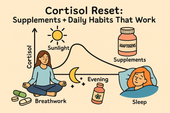
Cortisol Reset: Supplements + Daily Habits That Work
-
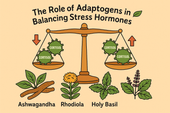
The Role of Adaptogens in Balancing Stress Hormones
Adaptogens work at the root of stress — your nervous system. 🌿 Learn how these powerful herbs help regulate cortisol, calm your nerves, and restore balance between energy and relaxation. ✨
-
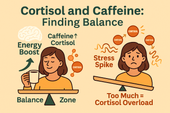
Cortisol and Caffeine: How Much Is Too Much?
Caffeine can boost energy and focus — but too much can overstimulate your stress hormones. ☕ Learn how caffeine affects cortisol, energy levels, and mood, and discover how to find the perfect balance for lasting calm and clarity. 🌿
-
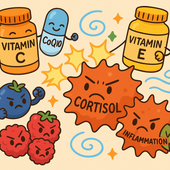
Antioxidants for Stress Management and Cortisol Control
When stress overwhelms your body, antioxidants come to the rescue. 🌿 Learn how vitamin C, CoQ10, and other natural compounds help reduce oxidative stress, regulate cortisol, and restore calm energy from within. ✨
-

Cortisol and Gut Health: How Probiotics May Help
Chronic stress doesn’t just affect your mind — it changes your gut. 🌿 Learn how cortisol disrupts the microbiome and how probiotics can help restore balance, improve digestion, and calm your stress response naturally. ✨
-

Vitamin D and Cortisol: Supporting Immune Balance
Vitamin D does more than strengthen bones — it helps regulate cortisol and support immune balance. 🌞 Learn how this essential hormone-like nutrient restores calm, improves mood, and strengthens your body’s natural stress defenses. 🌿
-

Omega-3s and Cortisol: Fighting Inflammation Naturally
Omega-3s are more than heart-healthy fats — they’re natural cortisol regulators. 🌿 Learn how EPA and DHA help reduce chronic inflammation, calm the nervous system, and support stress recovery from the inside out. ✨
-

High Cortisol and Belly Fat: Can Supplements Help?
Chronic stress can make belly fat harder to lose — but supplements like ashwagandha, magnesium, and omega-3s may help restore cortisol balance. 🌿 Learn how science-backed nutrients support fat metabolism, calm your stress response, and bring your body back into harmony. ✨
-

How Ginseng Can Support Energy and Cortisol Balance
Ginseng is one of nature’s most powerful adaptogens, helping your body handle stress without burning out. 🌿 Learn how this ancient root supports balanced cortisol, steady energy, and sharper focus — restoring vitality naturally and sustainably. ✨
-
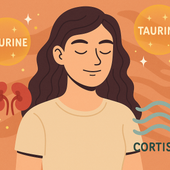
Taurine and Cortisol: Supporting Focus Under Stress
When cortisol surges, focus fades — but taurine helps restore balance. 🌿 Learn how this powerful amino acid calms your nervous system, regulates stress hormones, and sharpens concentration without jitters or fatigue. ✨
-

The Link Between Cortisol, Brain Fog, and Nutrient Deficiencies
When brain fog sets in, it’s not just in your head — it’s in your hormones. 🌿 Discover how cortisol imbalance and nutrient deficiencies like low magnesium, B vitamins, and omega-3s can cloud your focus and how restoring balance brings back mental clarity and calm. ✨
-

B Vitamins for Stress, Energy, and Cortisol Regulation
B vitamins are the foundation of stress resilience and steady energy. 🌿 Learn how this essential group of nutrients helps regulate cortisol, restore focus, and keep your nervous system calm — giving you balance from the inside out. ✨
-

Cortisol Imbalance and Chronic Fatigue: Can Supplements Help?
When chronic stress keeps cortisol high, fatigue and brain fog follow. 🌿 Learn how to rebalance your stress hormones naturally with calming nutrients, adaptogens, and lifestyle rituals that restore energy, focus, and inner peace. ✨
-

Adaptogen Stacks for Better Sleep and Lower Stress Hormones
Adaptogens can help your body recover from stress and sleep better by regulating key hormones like cortisol and adrenaline. 🌿 Learn how adaptogen stacks work to restore balance, calm the mind, and rebuild resilience — so you can rest deeply and wake renewed. ✨
-

Phosphatidylserine for Nighttime Cortisol Control
When stress hormones stay high at night, deep rest becomes impossible. 🌙 Discover how phosphatidylserine helps calm the brain, reduce nighttime cortisol, and restore healthy sleep rhythms — so you can wake up peaceful, clear, and recharged. ✨
-

Magnesium for Stress Relief and Cortisol Reduction
Magnesium is one of the most powerful natural tools for stress relief. 🌿 This essential mineral calms your nervous system, lowers cortisol, and helps your body recover from chronic tension. Learn how magnesium replenishes balance, improves sleep, and restores inner peace — naturally. ✨
-

Supplements to Improve Sleep by Balancing Cortisol
When cortisol stays high at night, sleep becomes a struggle. 🌙 Discover natural supplements that calm the nervous system, lower stress hormones, and restore your body’s natural rhythm. From magnesium and ashwagandha to L-theanine and phosphatidylserine, learn how to build deeper, more restorative rest. 🌿
-

Cortisol and Sleep: Why Stress Keeps You Awake
When stress keeps your body in fight-or-flight mode, cortisol refuses to calm down — and sleep becomes impossible. 🌙 Learn how elevated cortisol disrupts your circadian rhythm, suppresses melatonin, and turns restless nights into exhaustion. Discover how to restore balance and reclaim deep rest. ✨
-

L-Theanine for Cortisol Balance and Anxiety Relief
L-Theanine — the calming amino acid from green tea — helps quiet the mind and balance cortisol, the body’s key stress hormone. 🌿 Learn how it promotes calm focus, eases anxiety, and supports deep rest without sedation, backed by modern research and centuries of tradition. ✨
-

Rhodiola Rosea and Stress Resilience: A Natural Cortisol Regulator
Rhodiola rosea is one of nature’s most powerful tools for resilience. 🌿 This Arctic root helps balance cortisol, fight fatigue, and sharpen focus — keeping you calm yet energized even under stress. Discover the science behind Rhodiola’s adaptogenic power and how it helps your body thrive under pressure. ✨
-

Ashwagandha for Cortisol Balance: What the Science Says
Ashwagandha helps your body recover from chronic stress by calming the adrenal system and balancing cortisol — your key stress hormone. 🌿 Learn what science says about this powerful adaptogen, how it restores energy and focus, and why it’s one of nature’s most effective tools for modern stress relief. ✨
-

Supplements That Naturally Lower Cortisol Levels
When cortisol levels calm, your energy transforms — no more crashes or jitters, just steady focus and inner peace. 🌿 Learn which natural supplements and habits lower stress hormones, boost calm energy, and help your body thrive with balance instead of burnout. ✨
-

What Is Cortisol Imbalance? Symptoms You Shouldn’t Ignore
Cortisol — your body’s main stress hormone — keeps you alert and energized, but when it’s out of balance, it can drain your health. 🌿 Learn the signs of cortisol imbalance, from fatigue and anxiety to sleep disruption and stubborn weight gain, and discover how to restore calm, energy, and hormonal harmony naturally. ✨
-

The Best Daily Multivitamins for Menopausal Women
Menopause brings new nutritional needs that your old vitamin routine may no longer meet. 🌿 Discover how the right daily multivitamin can boost energy, balance mood, support bone and heart health, and keep your skin glowing. Learn which nutrients truly matter — from vitamin D to magnesium and B12 — to feel strong and vibrant every day. ✨
-

Antioxidants and Menopause: Fighting Inflammation Naturally
During menopause, oxidative stress and inflammation can quietly accelerate aging, fatigue, and skin changes. 🌿 Learn how antioxidants — from vitamins C and E to polyphenols in berries and green tea — help neutralize free radicals, reduce inflammation, and restore balance naturally. Discover the science of radiant, resilient aging. ✨
-

How CoQ10 Supports Heart Health After Menopause
After menopause, heart health becomes more important than ever. ❤️ Discover how CoQ10 — your body’s natural energy molecule — supports cardiovascular strength, restores vitality, and protects against oxidative stress. Learn how this essential nutrient helps keep your heart energized, balanced, and resilient through every stage of life. 🌿
-

Collagen Supplements for Skin and Joint Health Post-Menopause
After menopause, collagen loss affects both skin elasticity and joint comfort — but supplements can help rebuild from within. 🌸 Learn how collagen peptides, vitamin C, and other nutrients work together to restore firmness, reduce stiffness, and keep you glowing and mobile well into your next chapter. ✨
-

Calcium and Vitamin D: Protecting Bone Health in Menopause
Menopause brings hormonal changes that can weaken bones—but with the right nutrients, strength and stability can be rebuilt. 🦴 Learn how calcium and vitamin D work together to protect bone density, prevent fractures, and keep your body resilient. This guide explores nutrition, sunlight, and lifestyle habits that help your bones stay strong and vibrant for years to come. ☀️💪
-

Adaptogens for Energy and Resilience During Menopause
Feeling drained or emotionally scattered during menopause? 🌿 Discover how adaptogenic herbs like Ashwagandha, Rhodiola, and Ginseng can restore energy, balance cortisol, and build emotional resilience. Learn how these natural allies work with your body—not against it—to help you stay strong, focused, and calm through life’s hormonal changes. 🌸
-

Supplements That Help Beat Menopause Fatigue
Menopause fatigue can feel like more than tiredness—it’s a total energy crash. This guide explores how specific supplements, mindful breathwork, and therapy can help restore balance. Learn how nutrients like B vitamins, magnesium, and adaptogens rebuild your stamina, while breathwork and emotional healing calm your nervous system and bring vitality back to your days. 🌿✨
-

Herbal Blends for Menopausal Restlessness: Finding Calm in Transition
Herbal blends bring the wisdom of nature into moments of rest and renewal. Discover how soothing herbs like chamomile, lemon balm, and ashwagandha work together to calm menopausal restlessness, balance hormones, and invite deep relaxation. 🌿💫
-

Magnesium + Glycine for Deep Sleep During Menopause
Nutrients like magnesium, glycine, and B vitamins form the foundation for deep, restorative sleep during menopause. Discover how these natural compounds calm your nervous system, balance hormones, and help you wake up refreshed and recharged. 🌿💤
-

Melatonin and Menopause: Restoring Your Sleep Cycle
Nutrients are the foundation of hormone balance and energy. Learn how vitamins, minerals, and whole foods like greens, salmon, and berries nourish women’s bodies during menopause and beyond — restoring vitality, mood, and strength. 🌿🥗
-

How L-Theanine Helps With Menopausal Anxiety
Science continually deepens our understanding of the human body, from hormones to neurotransmitters. Discover how evidence-based research shapes modern wellness — bridging natural medicine, neuroscience, and hormone balance for healthier living. 🔬🌿
-

Can Ginkgo Biloba Improve Memory in Menopausal Women?
Hormone therapy can be a powerful tool for easing menopause symptoms and restoring balance. Learn how it works, the types available, and how to combine it safely with lifestyle and natural support for optimal well-being. 🌸💊
-

B Vitamins for Mental Clarity During Menopause
Nutrients are the foundation of mental and physical balance during menopause. Discover how vitamins, minerals, and whole foods like leafy greens, fish, nuts, and citrus can fuel energy, clarity, and calm while supporting hormonal health. 🌿✨
-

Mood Swings and Menopause: Natural Nutrient Support
Probiotics do more than support digestion — they help balance mood, hormones, and immunity too. Learn how a healthy gut microbiome can ease menopause symptoms, boost energy, and improve emotional resilience naturally. 🌿🦠
-

Brain Fog in Menopause: Supplements That May Help
Supplements can be powerful allies in restoring balance, energy, and focus—especially during menopause. Learn how nutrients like omega-3s, vitamin D, magnesium, and herbal adaptogens work together to support brain health, reduce stress, and promote lasting vitality. 🌿💊
-

Adaptogen Stacks for Reducing Night Sweats
Hormone detox isn’t about cleansing your body—it’s about restoring flow. Learn how the liver, gut, and endocrine systems work together to eliminate hormone buildup and how herbs like milk thistle, dandelion, and schisandra support balance, clarity, and natural vitality. 🌿💫
-

Cooling Menopause Symptoms with Herbal Support
Ashwagandha is one of nature’s most powerful adaptogens, helping women manage stress, sleep better, and balance hormones naturally. Discover how this ancient root supports calm energy, emotional resilience, and relief from menopause-related anxiety and fatigue. 🌿💫
-

Evening Primrose Oil and Menopause: What the Research Says
Hot flashes are one of the most common—and frustrating—symptoms of menopause. Discover what causes them, why the body’s “internal thermostat” becomes unbalanced, and the natural supplements and lifestyle shifts that can help you cool down, rest better, and feel more in control. 🔥💧
-

How Black Cohosh Helps with Menopausal Symptoms
Sleep disturbances are among the most exhausting symptoms of menopause—but they don’t have to rule your nights. Discover how natural strategies and calming supplements can help you fall asleep faster, stay asleep longer, and wake up feeling truly restored. 🌙💤
-

Natural Supplements That May Reduce Hot Flashes
Hot flashes can disrupt sleep, confidence, and daily comfort—but natural relief is possible. Discover the best research-backed supplements like black cohosh, red clover, and licorice root that may reduce hot flashes, balance hormones, and restore inner calm during menopause. 🌿💫
-

Omega-3s and Menopause: Supporting Mood and Inflammation
Omega-3 fatty acids are essential for hormonal harmony, brain function, and emotional balance—especially during menopause. Learn how these healthy fats reduce inflammation, support heart health, and restore calm, vitality, and focus through every stage of midlife. 🌊💫
-

The Role of Vitamin D in Menopausal Health
Vitamin D plays a powerful role in menopausal health—supporting bone strength, hormone balance, and mood stability. Discover how optimizing your vitamin D levels can improve sleep, energy, and emotional well-being while protecting long-term vitality through every stage of menopause. 🌞💪
-

Magnesium for Menopause: Relaxation, Sleep, and Hormonal Support
Self-regulation is the art of staying calm, centered, and in control—no matter what life throws your way. Learn how to strengthen emotional balance, manage stress responses, and cultivate inner peace through mindful techniques that reconnect your heart, body, and brain. 🌿💫
-

Can Adaptogens Like Ashwagandha Ease Menopausal Symptoms?
Brain fog during menopause can make even simple tasks feel overwhelming—but you’re not losing your sharpness, your hormones are simply shifting. Discover how adaptogens like ashwagandha and key nutrients can restore mental clarity, balance cortisol, and bring calm focus back to your day. 🌿🧠
-

Supplements That Support Hormonal Balance During Menopause
Herbal supplements have supported women’s health for centuries—and modern science is finally catching up. From ashwagandha and maca to red clover and rhodiola, discover how nature’s most trusted herbs can calm stress, balance hormones, and enhance energy through every life stage. 🌿✨
-

The Ultimate Motivation Stack: Supplements That Work Together
Discover how therapy helps restore motivation, focus, and emotional balance alongside supplement and mindset strategies. This empowering article explores how addressing thought patterns and emotional blocks through therapy can complement biochemical tools for long-term drive and well-being. 🧠💬


















































